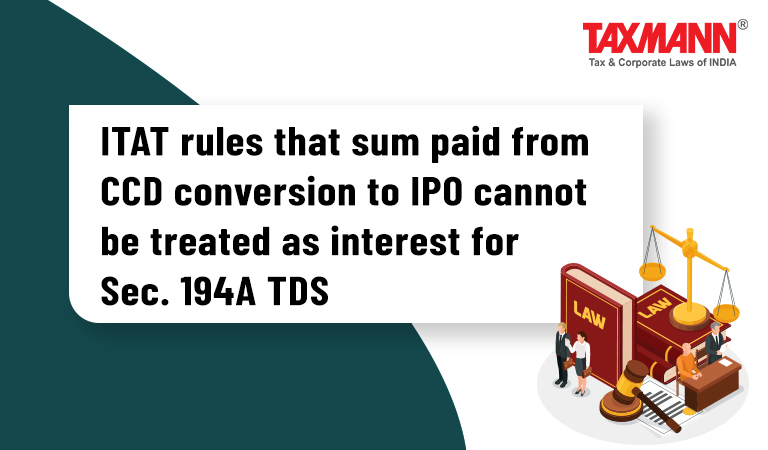ITAT rules that sum paid from CCD conversion to IPO cannot be treated as interest for Sec. 194A TDS
- Blog|News|Income Tax|
- 2 Min Read
- By Taxmann
- |
- Last Updated on 14 December, 2022

Case Details: Spectrum Power Generation Ltd. v. DCIT - [2022] 145 taxmann.com 238 (Hyderabad - Trib.)
Judiciary and Counsel Details
-
- Rama Kanta Panda, Accountant Member & K. Narasimha Chary, Judicial Member
- Kranthi, AR for the Appellant.
- Solge Jost Kottaram, CIT-DR for the Respondent.
Facts of the Case
Assessee-company had entered into a Scheme of Arrangement (SOA) with its secured creditors for restructuring of its debts and accordingly secured creditors were issued compulsorily convertible debentures (CCDs).
As per SOA, the assessee was required to pay a certain percentage of the additional amount to secured creditors from the date of conversion of CCDs into equity till the date of IPO. The Assessing Officer (AO) opined that the mode of payment of debts by issuing debentures or equity shares, instead of paying in cash, would not change the legal character of the same. Hence, payment of an additional amount associated with debt to be paid to creditors was interest as defined under section 2(28A).
Accordingly, AO invoked provisions of section 40(a)(ia) on the ground that said payment would be covered under section 194A.
ITAT Held
The Tribunal held that the SOA outlines that debt is to be discharged by the issuance of CCDs to the secured creditors with a coupon rate of 5% per annum, payable which will be converted into equity of the company to give a 10% equity stake. In the event of an IPO not materializing within five years, the secured creditors have the option to sell their equity stake/CCDs for a total value with accrued interest at the mentioned rate.
The debt of the assessee was discharged once the secured creditors were issued with CCDs pro rata inter se and converted into equity at a predetermined price. This ended the debt, while the additional amount was paid due to the delay in the assessee going to the IPO and not due to the debt.
The payment of an additional amount is triggered by the event of the assessee going for an IPO. If the assessee goes for an IPO immediately, no liability to pay an additional amount is incurred. If the assessee delays the IPO, they must pay an additional amount calculated at 5% per year, as well as give the secured creditors the option to sell their equity stake/CCDs for the total value plus accrued interest.
These facts suggest that the liability of the assessee to pay an additional amount is not related to the debt or CCDs, but contingent upon the assessee going to the IPO. Thus, this payment does not constitute a payment of interest and does not fall under section 2(28A). Accordingly, provisions of section 194A or 40(a)(ia) are not applicable.
List of Cases Referred to
-
- Palam Gas Service v. CIT [2017] 81 taxmann.com 43/247 Taxman 379/394 ITR 300/295 CTR 1 (SC) (para 5)
- ITO v. Parag Mahasukhlal Shah [2011] 12 taxmann.com 37/46 SOT 302/[2012] 143 TTJ 606 (Ahd. – Trib.) (para 6)
- Pr. CIT v. West Bengal Housing Infrastructure Development Corpn. Ltd. [2018] 96 taxmann.com 610/257 Taxman 570/[2019] 413 ITR 82 (Cal.) (para 6)
- Cauvery Spg. & Wvg. Mills Ltd. v. Dy. CIT [2011] 11 taxmann.com 193/200 Taxman 22 (Mag.)/[2012] 340 ITR 550/[2011] 238 CTR 55 (Mad.) (para 6).
Disclaimer: The content/information published on the website is only for general information of the user and shall not be construed as legal advice. While the Taxmann has exercised reasonable efforts to ensure the veracity of information/content published, Taxmann shall be under no liability in any manner whatsoever for incorrect information, if any.

Taxmann Publications has a dedicated in-house Research & Editorial Team. This team consists of a team of Chartered Accountants, Company Secretaries, and Lawyers. This team works under the guidance and supervision of editor-in-chief Mr Rakesh Bhargava.
The Research and Editorial Team is responsible for developing reliable and accurate content for the readers. The team follows the six-sigma approach to achieve the benchmark of zero error in its publications and research platforms. The team ensures that the following publication guidelines are thoroughly followed while developing the content:
- The statutory material is obtained only from the authorized and reliable sources
- All the latest developments in the judicial and legislative fields are covered
- Prepare the analytical write-ups on current, controversial, and important issues to help the readers to understand the concept and its implications
- Every content published by Taxmann is complete, accurate and lucid
- All evidence-based statements are supported with proper reference to Section, Circular No., Notification No. or citations
- The golden rules of grammar, style and consistency are thoroughly followed
- Font and size that’s easy to read and remain consistent across all imprint and digital publications are applied



 CA | CS | CMA
CA | CS | CMA
